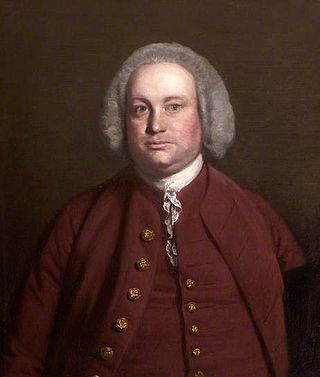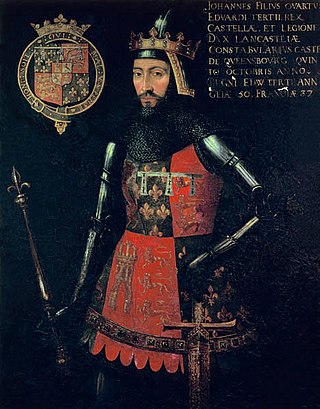
Edmund Hornby (1773-1857) of Dalton Hall near Burton, Westmorland, was a Member of Parliament for Preston, Lancashire, from 1812 to 1826. [2] He was a nephew and son-in-law of Edward Smith-Stanley, 13th Earl of Derby (1775-1851).

Edmund Hornby (1773-1857) of Dalton Hall near Burton, Westmorland, was a Member of Parliament for Preston, Lancashire, from 1812 to 1826. [2] He was a nephew and son-in-law of Edward Smith-Stanley, 13th Earl of Derby (1775-1851).
He was the eldest son and heir of Rev. Geoffrey Hornby (1750-1812), of Scale Hall, near Lancaster [3] in Lancashire, High Sheriff of Lancashire in 1774 and a Deputy Lieutenant of Lancashire, Colonel of a regiment of Lancashire militia, [4] by his wife Lucy Smith-Stanley (d.1833) a daughter of James Smith-Stanley, Lord Strange (1716–1771), (son and heir apparent of Edward Stanley, 11th Earl of Derby (1689-1776) of Knowsley Hall in Lancashire) and a sister of Edward Smith-Stanley, 12th Earl of Derby (1752-1834). Edmund's sister Charlotte Margaret Hornby (d.1817) married her first cousin Edward Smith-Stanley, 13th Earl of Derby (1775-1851), KG, and was the mother of Edward Smith-Stanley, 14th Earl of Derby (1799-1869), thrice Prime Minister of the United Kingdom (1852, 1858–9, 1866–8), thus Edmund's nephew. One of Edmund's younger brothers was Admiral Sir Phipps Hornby (1785-1867). [5]
He married his first cousin Lady Charlotte Stanley (d.1805), a daughter of Edward Smith-Stanley, 12th Earl of Derby (1752-1834), by whom he had issue including: [6]

Earl of Derby is a title in the Peerage of England. The title was first adopted by Robert de Ferrers, 1st Earl of Derby, under a creation of 1139. It continued with the Ferrers family until the 6th Earl forfeited his property toward the end of the reign of Henry III and died in 1279. Most of the Ferrers property and the Derby title were then held by the family of Henry III. The title merged in the Crown upon Henry IV's accession to the throne in 1399.

Edward Smith-Stanley, 13th Earl of Derby, KG, of Knowsley Hall in Lancashire, was a politician, peer, landowner, builder, farmer, art collector and naturalist. He was the patron of the writer Edward Lear.

Edward Smith-Stanley, 12th Earl of Derby PC, usually styled Lord Stanley from 1771 to 1776, was a British peer and politician of the late eighteenth and early nineteenth centuries. He held office as Chancellor of the Duchy of Lancaster in 1783 in the Fox–North coalition and between 1806 and 1807 in the Ministry of All the Talents.
Thomas Lyon-Bowes, 11th Earl of Strathmore and Kinghorne was a Scottish nobleman and peer. He was the third son of John Bowes, 9th Earl of Strathmore and Kinghorne, and Mary Bowes, Countess of Strathmore and Kinghorne. His mother was the author of the verse drama, "The Siege of Jerusalem" (1769). He was the great-great-grandfather of Queen Elizabeth The Queen Mother.

Charles William Bigge was an English merchant and banker in Newcastle on Tyne.
The High Sheriff of Monaghan was the British monarch's representative in County Monaghan, a territory known as his bailiwick. Selected from three nominated people, he held his office for the duration of a year. He had judicial, ceremonial and administrative functions and executed High Court Writs.

James Buller of Morval in Cornwall and of Downes and King's Nympton in Devon, was a Member of Parliament for East Looe in Cornwall (1741-47) and for the County of Cornwall (1748-1765). He was ancestor of the Viscounts Dilhorne and the Barons Churston and built the Palladian mansion Kings Nympton Park in Devon.

The High Sheriff of Lancashire is an ancient officer, now largely ceremonial, granted to Lancashire, a county in North West England. High Shrievalties are the oldest secular titles under the Crown, in England and Wales. The High Sheriff of Lancashire is the representative of the monarch in the county, and is the "Keeper of The King's Peace" in the county, executing judgements of the High Court through an Under Sheriff.
Admiral Sir Phipps Hornby, was a prominent and experienced Royal Navy officer of the nineteenth century. Hornby served on frigates throughout most of his wartime experience, which included witnessing the Nore Mutiny first hand aged 12 in 1797. Later, commanding his own sixth-rate HMS Volage in 1811, Hornby played a vital role in the British victory at the Battle of Lissa. At Lissa a British squadron under William Hoste overwhelmed a French force more than twice their own strength, Volage combating a much larger ship alone for several minutes and taking numerous casualties, including Hornby, who was wounded.

James Smith-Stanley, Lord Strange (1716–1771) was commonly known by that title, though neither he nor his father had any claim to it. He was the eldest son of Edward Stanley, 11th Earl of Derby, whose predecessor's heirs had used that courtesy title, but the right to two successive baronies Lord Strange had descended to daughters, when the earldom had passed to the heir male.
George Stanley, 9th Baron Strange, of Knockin, KG, KB (1460–1503) was an English nobleman and heir apparent of Thomas Stanley, 1st Earl of Derby. He was also a notable soldier in his own right and held a number of senior offices of state.

Dalton Hall is a country house near Burton-in-Kendal in northern England. The hall lies within the county palatine of Lancaster, while Burton lies in the historic county of Westmorland. Both have formed part of Cumbria since 1974.

Francis Leke, 1st Earl of Scarsdale (1581–1655) of Sutton Scarsdale Hall, was an English peer who fought for the Royalist cause in the Civil War.
The High Sheriff of Carlow was the British Crown's judicial representative in County Carlow, Ireland from the 14th century until 1922, when the office was abolished in the new Free State and replaced by the office of Carlow County Sheriff. The sheriff had judicial, electoral, ceremonial and administrative functions and executed High Court Writs. In 1908, an Order in Council made the Lord-Lieutenant the Sovereign's prime representative in a county and reduced the High Sheriff's precedence. However, the sheriff retained his responsibilities for the preservation of law and order in the county. The usual procedure for appointing the sheriff from 1660 onwards was that three persons were nominated at the beginning of each year from the county and the Lord Lieutenant then appointed his choice as High Sheriff for the remainder of the year. Often the other nominees were appointed as under-sheriffs. Sometimes a sheriff did not fulfil his entire term through death or other event and another sheriff was then appointed for the remainder of the year. The dates given hereunder are the dates of appointment. All addresses are in County Carlow unless stated otherwise.

Wennington Hall is a former country house in Wennington, a village in the City of Lancaster district in Lancashire, England. The house is a Grade II listed building and was occupied by Wennington Hall School until 31 August 2022, the site is now subject to tender, after the LEA were unable to secure academic status.
Henry John Adeane DL was an English barrister and politician.

John Taylor (1711–1775) of Bordesley Hall near Birmingham, was an English manufacturer and banker. He served as High Sheriff of Warwickshire in 1756–57.
The Manor of Bratton Fleming was a medieval manor estate in Bratton Fleming, Devon, England.

Richard Knight (1659–1745), of Downton Hall, in the parish of Downton on the Rock in Herefordshire, England, was a wealthy ironmaster who operated the Bringewood Ironworks, on the Downton estate, and founded a large fortune and family dynasty.
Thomas Henry Clifton was a Conservative Party politician in the United Kingdom.